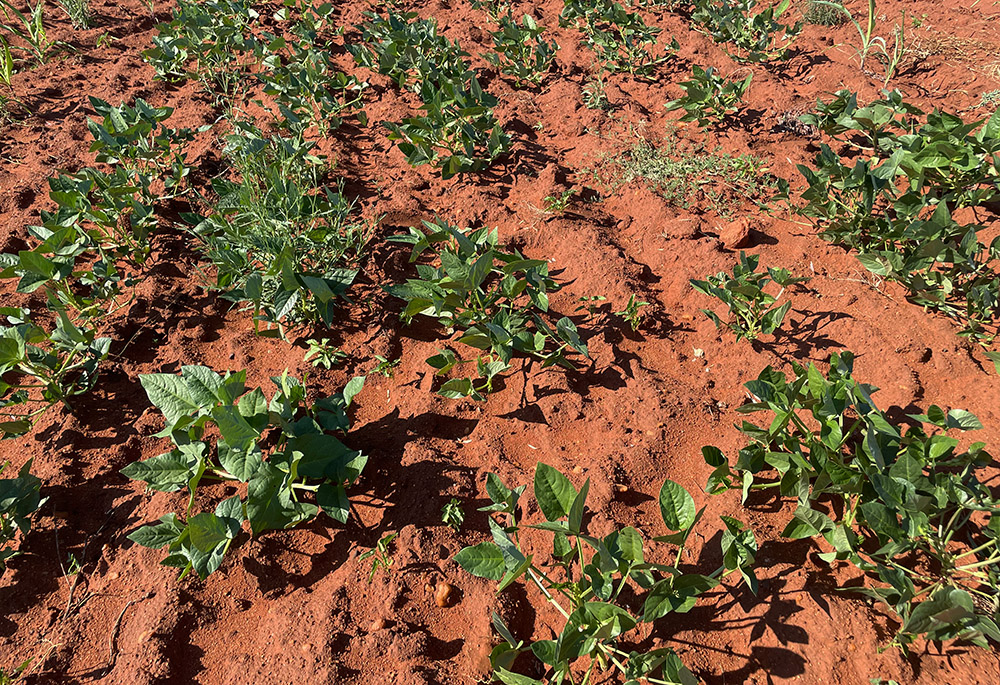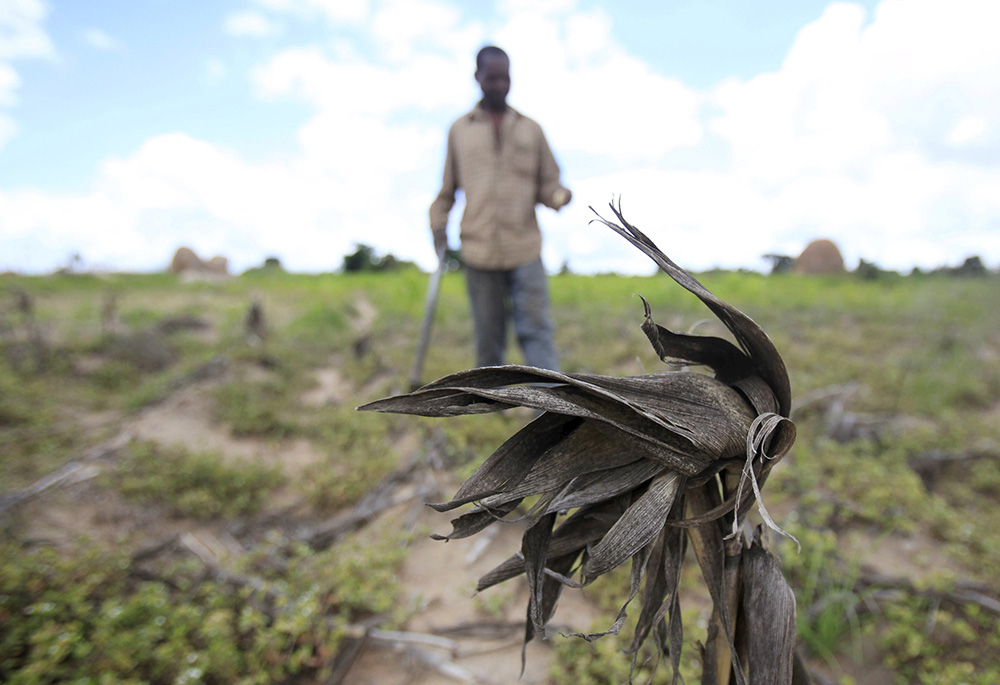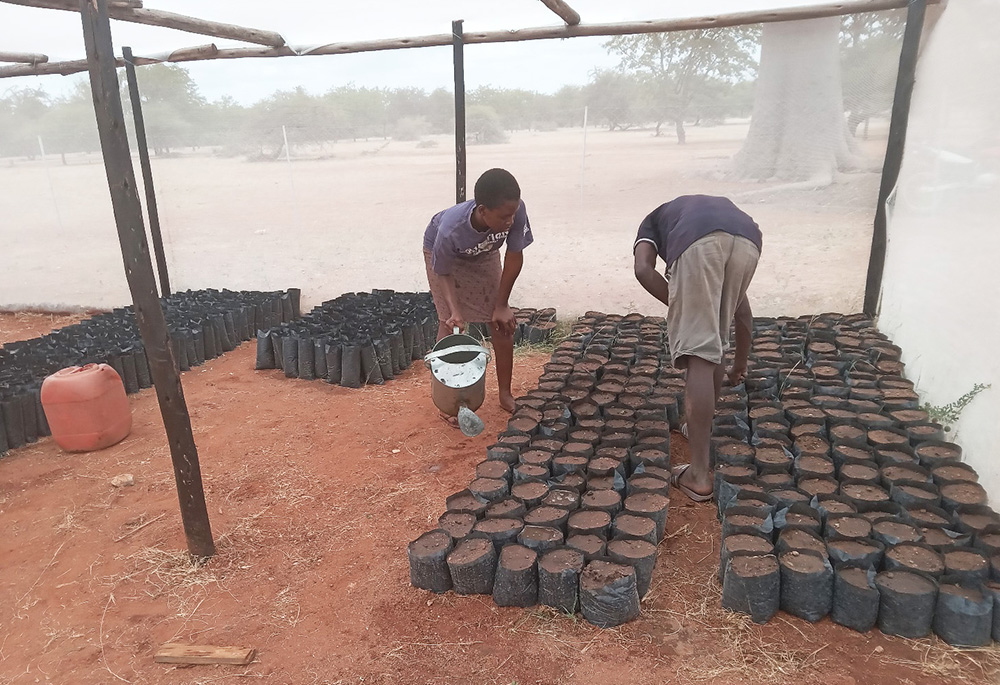
Despite a dry spell exceeding 30 days, the cowpea plants at Malala village in Beitbridge district, Zimbabwe, are still going strong. The leaves and peas supply families with more diverse nutrition options. Catholic Relief Services provided training and drought-resistant seeds to help farmers produce a harvest even during droughts. (CRS/Richard Savo)
As an El-Niño-induced drought hits Zimbabwe's rural areas, Catholic agencies are escalating humanitarian assistance aimed at smallholder farmers.
Like many southern African countries, Zimbabwe has not been spared the ravages of climate change that have affected food production. In a country where rural dwellers grow their own food, climate uncertainty has meant extended periods of drought and hunger.
Despite numerous announcements by the government that the country had harvested enough to boost the country's grain reserves, as the year began, international aid agencies warned that millions of Zimbabweans would require food assistance, citing poor harvests after an extended dry spell.
Concerns have been raised about the reluctance of smallholders to grow certain grains despite evidence of those grains' drought resistance and nutritional value.
Smallholder farmers — small-scale farms defined not just by size, but also by agricultural techniques and the use of family labor — produce the bulk of the country's grain such as corn, but the government has warned that overreliance on rain-fed agriculture is compromising both household and national food security.
Agencies such as Caritas and Catholic Relief Services are exploring long-term climate resilience solutions to address food security concerns. The Catholic agencies are helping subsistence farmers adopt drought-resistant small grains to build climate resilience across the country and ensure food security at the household level.

A file photo shows a Zimbabwean man walking through his drought-affected corn field outside Harare. (OSV News photo/Reuters/Philimon Bulawayo)
"The hunger situation in the country is very dire. Many households are facing food shortages and malnutrition because of the poor harvest from the previous season and the lack of grazing for their livestock. The main reason for this is the delayed and erratic rainfall that has affected the planting and growing of crops," said Martha Zvarevashe, a Caritas development coordinator.
By providing farmers with drought-resistant small grain seeds, the agencies are promoting new climate knowledge narratives in a country where agriculture authorities have struggled to convince farmers to adopt these new farming practices.
Requiring minimal moisture, sorghum, millet, rapoko, lucerne, velvet beans and other small grains are traditional crops that have been grown for years in some rural areas. These crops, however, have been unpopular with some farmers, many of whom have instead turned to cash crops such as cotton and tobacco.
While agencies say small grains offer high nutritional value, some subsistence farmers still favor growing corn, the country's staple. Yet in the absence of adequate rainfall, insistence on planting corn has exposed farmers to cyclical crop losses. Amid such challenges, periods of empty granaries have also been extended.
"The lean season has been getting longer and longer in recent years due to the effects of climate change, poor harvests and economic challenges," said Moffat Moyo, a food security and livelihoods program manager for Catholic Relief Services.
"We are also experiencing an El Niño event, which means that rainfall and temperature patterns are disrupted. This will affect the quality and quantity of crops and have a negative impact on the food security of the households," Moyo told EarthBeat.

Youth in Malala village, in Beitbridge district, Zimbabwe, plant fruit trees to provide alternate sources of income for farmers and nutrition options for families. Catholic Relief Services works with Caritas to train farmers and provides seedlings to support farmers. (Caritas Masvingo/Alifa Mbedzi)
The agriculture ministry is promoting what it calls "agro-ecological tailoring," where cropping is designed to fit regional climate patterns. Zimbabwe has five regional zones with different climate conditions. Some areas are suitable for cattle ranching while others are favorable for crops.
What Catholic agencies are promoting seeks to adapt farming practices to match the climate conditions of the various zones.
"That is why we need to help farmers adapt to climate change and diversify their crops and income sources. It is important that we encourage farmers to grow small grains like millet, sorghum, and pulses like cowpeas, which are more drought-tolerant," said Zvarevashe.
The Catholic agencies are also exploring other ways to help smallholders adapt to the effects of climate change.
"We are also working to mitigate climate change by promoting holistic rangeland and livestock management," Zvarevashe said.
Advertisement
"This means that we are helping the farmers to improve the quality and quantity of their pastures and animals, by planting trees, grasses and legumes that can provide fodder and improve soil fertility," she told EarthBeat. "This way, we can increase their resilience and ability to adapt to climate change."
These efforts fall within the call made by Pope Francis in "Laudato Si', on Care for Our Common Home." The Laudato Si' website specifically calls for the development of resilient food systems and "ensuring the right to food for all."
"I have witnessed the impact of climate change on the farming communities," said Zvarevashe. "Many smallholder farmers who depend on agriculture for their livelihoods are facing hunger and poverty. Normally, by this time of the year, we would have some crops ready to harvest, such as maize or vegetables, but this year there is nothing."
Small grains, like those being promoted by the Catholic agencies to climate-impacted smallholders, could provide a way to food security in the future.





